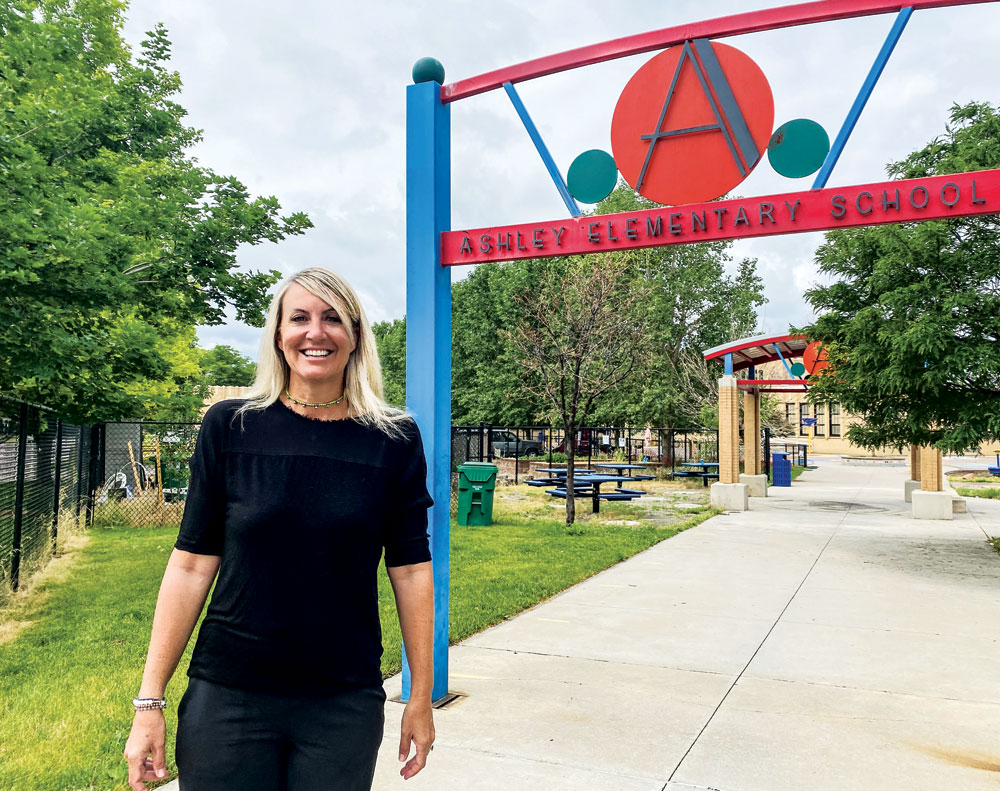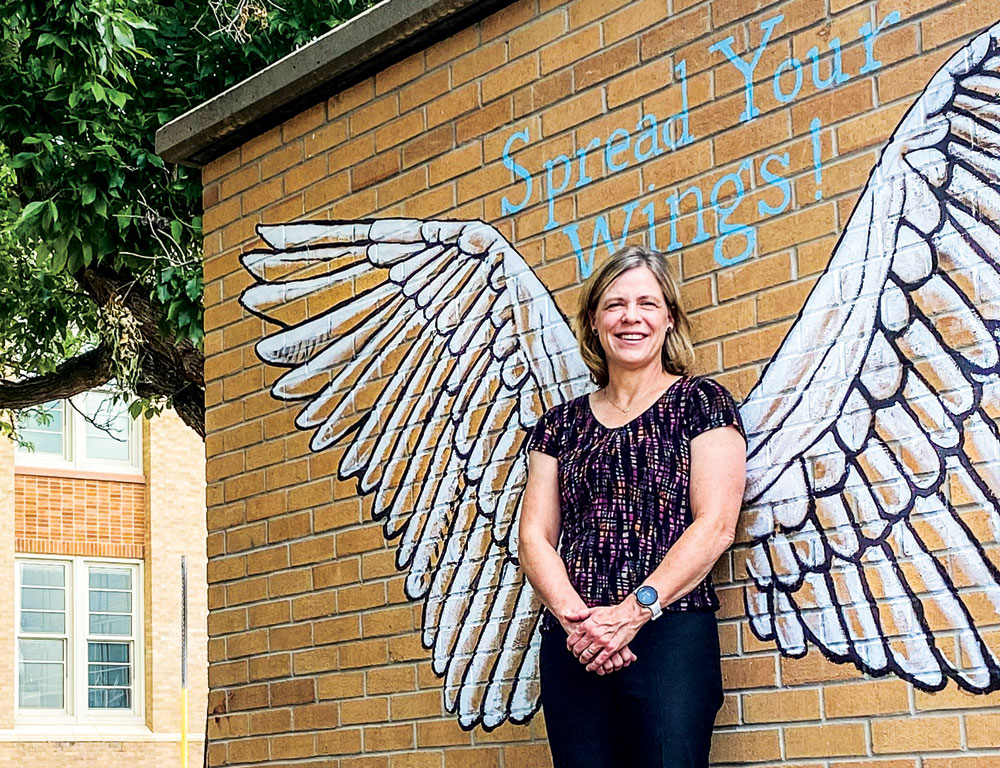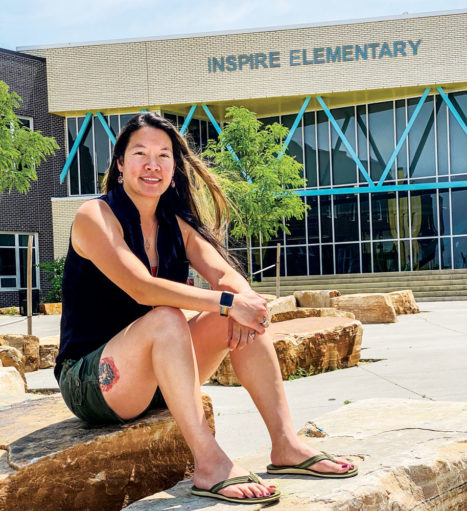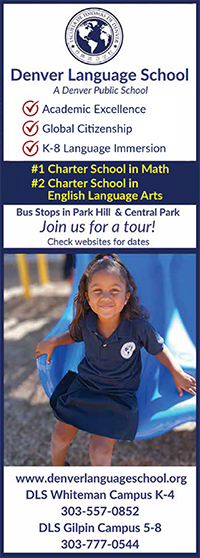
Ashley Principal Liz TenCate says she very concerned about kids who decide to stay remote. “I would love to see data. I want families who make that decision to understand the ramifications, particularly on early learning.”
If you call 2020 “a lost academic year,” Susan Miller-Curley, the incoming principal at Montclair School of Academics and Enrichment, will be quick to point out the positive. “It was not a lost year,” she says. “Our students learned independence, how to organize their work, and our communication with families is so much stronger. We actually gained a lot of skills.”
Miller-Curley isn’t the only optimist. Linda August, Inspire Elementary School’s brand new principal, says, “COVID-19 pushed us to our limits, but it also showed us what we’re capable of; it was precarious and unknown, but our educators are strong and passionate. They didn’t quit.”

Susan Miller-Curley calls Montclair a “hidden gem” with one of the most diverse populations in Denver. They’re 42 percent black or African American, 34 percent Latino, with 11 percent identifying as multiple races.
Liz TenCate, principal at Ashley Elementary School and former principal at Swigert Elementary (2017-2019) and Cory Elementary (2011-2017) says the bright spot was, “ending the school year with in-person learning. With 95 percent of the staff vaccinated, it was great to see kids settle back into social relationships. Even with masks and constant hand-washing, it gave us a sense of hope for normalcy and a belief that things will be better in the future.”
The Future is a Hybrid of Old, New, Focus, & Fun
Much of academia is returning to normal. According to August, students will no longer need to cohort or avoid their peers in the halls, and they will be allowed to share materials. “That’s huge,” says August. “Because not being able to share or play with the same toy can create a strained friendship. When you have to stay three feet apart it changes the dynamic of a relationship; kids miss hugging up on their teachers. They can do projects together; they can ask questions together side-by-side.”
Educators are also finding ways to keep what worked during COVID. According to August, they’ve known for a long time that online learning works best for some kids, and COVID allowed them to work out some of the kinks in online learning. “We have to figure out how to combine what we did before with the new normal to create best practices,”

Linda August says her focus is in educating the “whole child.” “We’re looking at all students, and we’re pushing them all forward.”
One of Miller-Curley’s goals is to complete a home visit with every family by the end of August. “We found there’s higher participation if we do it virtually, so we’ll do that again. We’re really dedicated to sitting down with all our families and talking about their student’s hopes and dreams. We’ve learned showing up and showing that you care about their kids goes a long way to making kids feel welcome.”
According to TenCate, the key to best practices will be creating engagement, so students can stay invested and make big gains. “Although we don’t have comprehensive data sets at this point, it does look like about 80 percent of our younger students who stayed remote all year did experience significant learning loss. It’s really hard to teach a kindergartner to read online. It’s extremely difficult to understand the concept of numeracy without manipulatives. We are the students’ first entry into education, so it’s hugely important that we develop a love for learning. There’s a laser focus on skill building and concept building, but there’s a balance that keeps kids excited to come to school to learn. We can do remediation without losing that joyful piece. Little people—especially—have to see the meaning, and they have to find the joy, or it’s not going to stick.”
Miller-Curley describes additional staffing and resources that will help students get caught up after a year of online learning. “We have a strong data assessment system that lets us know where kids are, so we can give them the help they need. We also have four senior team leads… working with kids, so that’s a lot of additional support in literacy and math. We’re also using our stimulus money to fund mental health.”
Building Equity Through Community
Miller-Curley says, “We have to create classrooms where kids are safe, loved, and seen.” Part of that “seen” piece means communities whose contributions and histories that have previously been marginalized by the education system need to be more fully integrated into the curriculum.. Miller-Curley likens the new approach to teaching a novel where no one’s history is relegated to just one chapter. “We can’t keep telling just one side of the story. Kids have to see themselves in the curriculum.”
The district does not teach Critical Race Theory, says Will Jones, Director of External Communications for DPS, but conversations with the principals make clear that they are embracing a new anti-racist curriculum—one that moves beyond teaching the history of slavery and the Civil Right’s Movement to a curriculum that is fully inclusive. Some of the district’s work includes implicit bias training for teachers, reading anti-racist literature, and working with Promise 54, a group dedicated to recruiting and retaining educators of color. The Board has also passed two resolutions intended to support an inclusive learning environment—The Know Justice, Know Peace Resolution and the Black Excellence Resolution. The former calls for curriculum and professional practices to “include comprehensive historical and contemporary contributions [of] Black, Indigenous, and Latino communities.” The latter aims to “prioritize student success, be a district that is community-driven and expertly-supported [while] being equitable by design.”
Miller-Curley’s staff is reading “Enrique’s Journey” and “Stamped: Racism, Anti-racism, And You,” and she adds, “The district has developed modules called The Equity Experience that all teachers and administrators will be going through in the next year or two.”
Ashley Elementary has partnered with an organization called “Young Men of Purpose” as part of their equity work. The mentoring program provides boys from 4th grade to high school with coaching, role-modeling, and other opportunities. TenCate calls it, “a partnership that builds community.”
Inspire Elementary hosted a focus group for black parents. August says, “We started by asking, ‘What has your experience been with our school?’ And it was a great first step. We had a lot of other questions to ask, but that one carried the conversation for a really long time, so we let them talk, and we listened. We really listened.”




0 Comments